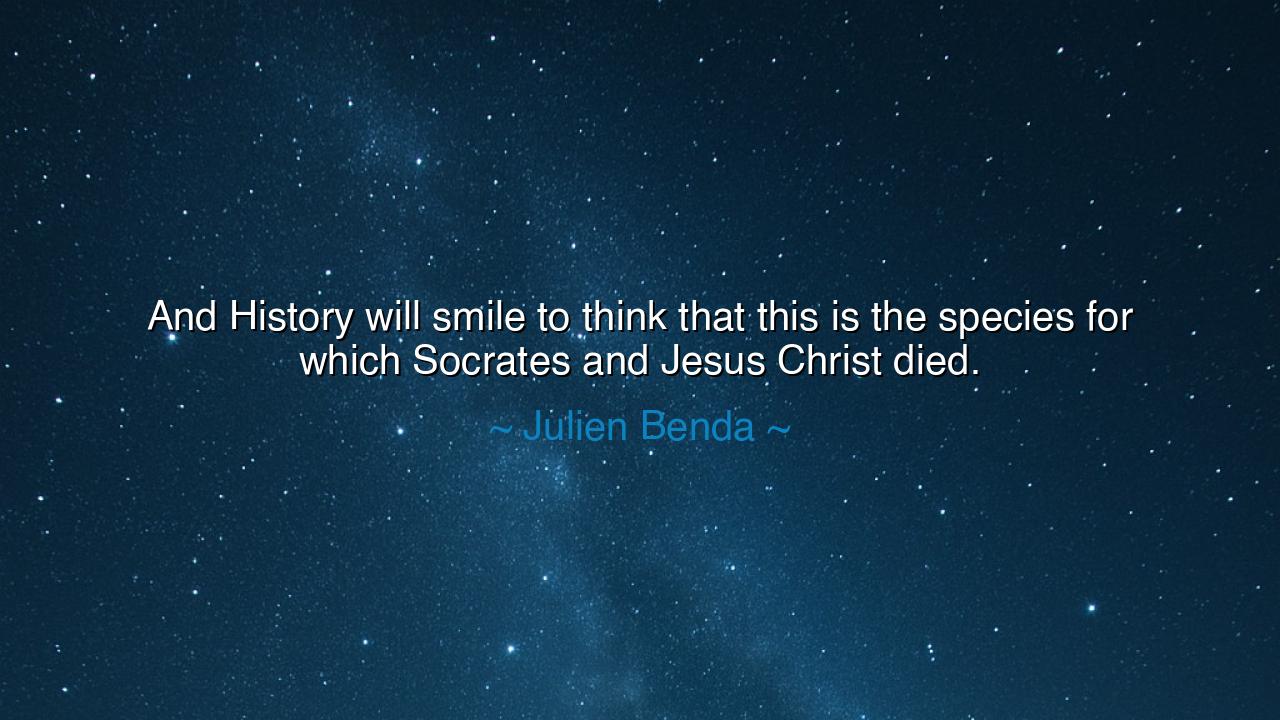
And History will smile to think that this is the species for
And History will smile to think that this is the species for which Socrates and Jesus Christ died.






Julien Benda once wrote with a mixture of irony and sorrow: “And History will smile to think that this is the species for which Socrates and Jesus Christ died.” At first hearing, the words sound almost mocking, yet they carry a weight both tragic and profound. For they remind us of the paradox of humanity: that the greatest teachers, the noblest martyrs, gave their lives not for a race of gods or angels, but for a species so often foolish, selfish, and cruel. History, Benda says, will not weep, but smile—a bitter smile at the strange contradiction that such immeasurable sacrifice was offered for such frail creatures.
To understand, we must look at the origin of these names. Socrates, the philosopher of Athens, drank the cup of poison rather than betray his principles. He died for the pursuit of truth, for the belief that questioning, reason, and the examined life were worth more than life itself. Jesus Christ, the prophet of compassion, accepted the cross rather than renounce his mission of love, forgiveness, and the salvation of humankind. Both men could have fled, could have saved themselves, yet both gave their lives as offerings to mankind. And yet, the mankind they served was far from pure: it was the same mankind that condemned, mocked, and destroyed them.
History’s smile, as Benda says, is not the smile of joy but of irony. It is the smile one makes when beholding the contradictions of fate: that those who received such gifts of wisdom and love repaid their benefactors with death, that the very species that inspired sacrifice so often chooses ignorance, violence, and betrayal instead. The smile is history’s way of saying, “So be it—this is the way of man.” It is the cosmic shrug at the irony of noble sacrifice met by ignoble conduct.
But even within this irony lies a deeper lesson. For though mankind was unworthy, the acts of Socrates and Christ were not wasted. Their deaths became symbols, their lives seeds planted in the soil of time. Socrates’ questions still guide philosophy; Christ’s teachings still echo in the hearts of billions. History may smile at man’s unworthiness, but it cannot deny the power of sacrifice, the way it transcends the pettiness of the human condition. The smile is tinged with sorrow, yet it also acknowledges that greatness can arise even when humanity least deserves it.
We see this echoed again in the lives of others who sacrificed for humanity. Consider Mahatma Gandhi, who was slain by violence even as he preached peace. Consider Martin Luther King Jr., who was cut down by hatred while proclaiming love and justice. History may smile at the absurdity that such men gave their lives for a species still wrestling with cruelty, but the legacy of their sacrifice continues to inspire, to instruct, to call mankind to rise higher than its instincts.
The teaching for us is profound: we must recognize the irony of our inheritance and resolve not to perpetuate it. If the greatest teachers died for us, let us strive to be worthy of their sacrifice. Do not let history only smile in bitter irony; let it also smile in hope, seeing that the seeds of wisdom and love they planted have borne fruit in our lives. To honor Socrates is to live examined lives, guided by truth. To honor Christ is to live with compassion, forgiving and uplifting others. To honor all such martyrs is to ensure their blood was not shed in vain.
So, my children, remember Benda’s words, but do not leave them in despair. Yes, history will smile at the paradox of man’s unworthiness—but it is within our power to transform that smile into one of pride. Live in such a way that the sacrifices of the great are justified. Live in such a way that future generations will say: “Yes, mankind was frail and foolish—but it was also capable of greatness, capable of redemption, and worthy of the lives given for its sake.” For in the end, the true answer to history’s ironic smile is not bitterness, but the daily striving to become the humanity that Socrates and Christ envisioned.






AAdministratorAdministrator
Welcome, honored guests. Please leave a comment, we will respond soon